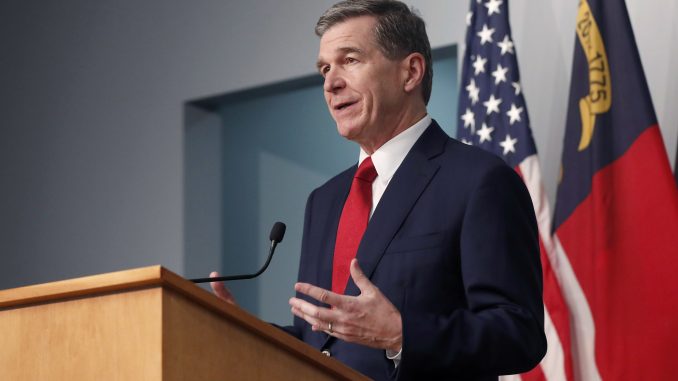
RALEIGH — Gov. Roy Cooper recently announced the release of $175 million to help North Carolinians pay their rent and utilities bills that have mounted due to the pandemic and subsequent shutdowns.
“COVID-19 has strained family finances across North Carolina, and many people are struggling to make ends meet,” said Cooper in a statement. “People need a safe, stable place to call home, especially during this pandemic, and we must help keep people in their homes and keep their utilities on while our economy recovers.”
The money will be distributed through three programs that are “designed to work together to help people avoid eviction and pay their bills.” The programs include eviction prevention and utility payments, crisis response and housing stability, and local government funds.
Around $94 million of the funding will be disbursed by the North Carolina Office of Recovery and Resiliency (NCORR) for eviction and utility payments. Money will be given to eligible community agencies to assist individuals with the application and disbursement process. According to the press statement, $28 million will come from the federal Community Development Block Grant — Coronavirus (CDBG-CV). The remaining $66 million will come from the CARES Act Coronavirus Relief Fund (CRF).
Under crisis and stability, $53 million of the funding is “designated for the Emergency Solutions Grant-Coronavirus (ESG-CV) Program through the North Carolina Department of Health and Human Services (NCDHHS).” The federal ESG-CV money is for families who are homeless or who face a more immediate risk of homelessness.
Information about how people can apply for the NCORR program and the ESG-GV program will be shared once the programs have launched in the coming weeks, according to the governor’s news release.
Local governments will see $28 million in federal funding will be administered by the N.C. Department of Commerce. These funds also are from the federal CDBG-CV program. The funds will be administered by incorporated municipalities under 50,000 residents and counties under 200,000 residents that apply to participate.
Local governments receiving the funds are “encouraged to prioritize the money locally to help their residents pay rent and outstanding utility bills.” These funds can also be used to support internet access, food distribution as well as COVID-19 testing and diagnosis.
The application process is now open for local governments to apply for the Commerce-administered funding. Eligible local governments wishing to apply for the Commerce CDBG-CV program should contact the N.C. Dept. of Commerce or visit the agency’s website at nccommerce.com.
The $175 million comes on the heels of utility providers in the state facing bankruptcy as the result of unpaid bills allowed to accumulate under two of the governor’s COVID-19 related executive orders, 142 and 124.
The latest report in August by the NC Utilities Commission (NCUS) to the governor, stated there are “1,092,262 residential and non-residential accounts past due, carrying an aggregate amount of $273,145,950 in customer arrearages.”
The report says that the total reported arrearages increased $15,296,410 over last month despite 52 fewer utilities reporting this data for this reporting period.
Utility providers reported “438,3814 residential customer accounts became eligible for disconnection due to non-payment but were not disconnected during the Reporting Period, compared with 490,845 accounts reported in June.” Residential customers racked up $10,211,981 in late fees and penalties in addition to the $41,506,489 in late fees and penalties reported by providers between April 1 and July 31.
Non-residential accounts saw similar accumulation of penalties and fees of $1,395,041 for the reporting period and “contributing to $5,406,026 in total between April 1 and July 31.” Utility providers reported that 25,8654 non-residential customer accounts became eligible for disconnection due to non-payment compared to 28,700 reported in June.
The CARES Act’s 120-day moratorium on evictions expired on July 25. The moratorium covered renters in federal housing assistance programs or who live on a property with a federally backed mortgage. That moratorium also barred property owners from filing new evictions against tenants for non-payment as well as blocking owners from charging any related non-payment fees.
North Carolina also prohibited evictions through Cooper’s executive orders, as well as orders issued by the N.C. Supreme Court’s Chief Justice Cheri Beasley.
Beasley issued a memo on March 15 that placed summary evictions on hold. Such evictions are instances where “criminal activity is occurring which put the health, safety, and welfare of others in danger.” The first time Cooper mentioned eviction or utility moratoriums was in executive order 124, with an end date of April 17.
May 30, Cooper issued Executive Order 142, stopping all evictions for non-payment, commercial or residential, for three weeks. It also stopped late fees from accumulating for 21 days with an end date of June 20. Tenants were given up to six months to pay off costs incurred during that time. The same day, Beasley issued an order extending eviction postponements until June 21 with no evictions served until June 30. At the time of Beasley’s May 30 order, there were 9,000 pending evictions.
By Beasley’s June 29 order, extending the deadline again, there were 10,500 evictions pending. In her July 24 order, eviction processes were suspended again until Aug. 23. On Aug. 24, Beasley issued another order extending eviction prohibitions again to Sept. 22.


